The first titles in the new “John Murray Journeys” series of travel books are due to be published this week.
The New York Times Book Review has marked the Fourth of July weekend with a special issue featuring books about America’s past, present and future. Among them are two new books on Texas; memoirs of family migration; the journalist John Gunther’s Inside U.S.A, first published in 1947; and Republic of Detours, which tell how unemployed writers — including Zora Neale Hurston, Nelson Algren and Richard Wright — were hired to write idiosyncratic guides to the country during the 1930s.
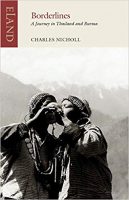
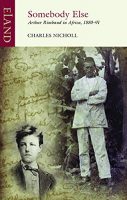 Eland Books, which recently brought back into print Charles Nicholl’s Borderlines: A Journey in Thailand and Burma (1988), is to follow that at the end of this month with Somebody Else: Arthur Rimbaud in Africa, 1880-91 (£14.99), an account of the poet’s “lost years” that won Nicholl the 1998 Hawthornden Prize (for “the best work of imaginative literature)”.
Eland Books, which recently brought back into print Charles Nicholl’s Borderlines: A Journey in Thailand and Burma (1988), is to follow that at the end of this month with Somebody Else: Arthur Rimbaud in Africa, 1880-91 (£14.99), an account of the poet’s “lost years” that won Nicholl the 1998 Hawthornden Prize (for “the best work of imaginative literature)”.
Nicholl was interviewed recently about Borderlines by Jeremy Bassetti for his Travel Writing World podcast.
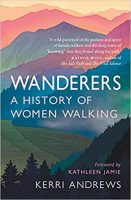 Wanderers: A History of Women Walking, edited by Kerri Andrews and with an introduction by Kathleen Jamie, is out in paperback next week (Reaktion Books, July 12, £9.99). It’s a book about 10 women “who have found walking essential to their sense of themselves as women, writers and people” — from Elizabeth Carter, a parson’s daughter of the 18th century, who wanted nothing more than to be taken for a vagabond in southern England, to Cheryl Strayed, author of Wild, who set out to be “a woman who walks alone in the wilderness for eleven hundred miles”.
Wanderers: A History of Women Walking, edited by Kerri Andrews and with an introduction by Kathleen Jamie, is out in paperback next week (Reaktion Books, July 12, £9.99). It’s a book about 10 women “who have found walking essential to their sense of themselves as women, writers and people” — from Elizabeth Carter, a parson’s daughter of the 18th century, who wanted nothing more than to be taken for a vagabond in southern England, to Cheryl Strayed, author of Wild, who set out to be “a woman who walks alone in the wilderness for eleven hundred miles”.
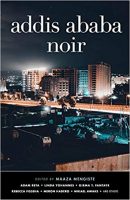 I’ve mentioned before the series of city-inspired noir anthologies published by Cassava Republic. The latest, Addis Ababa Noir, due out on August 4 (£12.99), is edited by Maaza Mengiste, who was short-listed for the 2020 Booker Prize for The Shadow King, and won an Edgar Award for a short story she includes in this new collection. She promises that the authors whose work she has chosen will open up their city: “Let them lead you down their streets and alleyways, into their characters’ homes and schools, and show you all the hidden corners, the secrets, and the lapsed realities that hover just above the Addis that everyone else sees.”
I’ve mentioned before the series of city-inspired noir anthologies published by Cassava Republic. The latest, Addis Ababa Noir, due out on August 4 (£12.99), is edited by Maaza Mengiste, who was short-listed for the 2020 Booker Prize for The Shadow King, and won an Edgar Award for a short story she includes in this new collection. She promises that the authors whose work she has chosen will open up their city: “Let them lead you down their streets and alleyways, into their characters’ homes and schools, and show you all the hidden corners, the secrets, and the lapsed realities that hover just above the Addis that everyone else sees.”
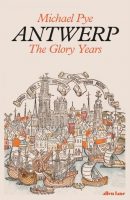 Michael Pye has written books on subjects from New York (Maximum City) to the North Sea (The Edge of the World). His latest is Antwerp: The Glory Years (Allen Lane, August 5, £25), in which he paints a portrait of the city between 1500 and 1570. It was then, he writes, “a world city, a centre of stories published across Europe, a sensation like nineteenth-century Paris or twentieth-century New York, one of the first cities where anything could happen or at least be believed. Other cities showed the power of kings or dukes or empires, but Antwerp showed only itself: a place of trade, where people wanted, needed to be, or couldn’t afford not to be. It was famous on its own terms.”
Michael Pye has written books on subjects from New York (Maximum City) to the North Sea (The Edge of the World). His latest is Antwerp: The Glory Years (Allen Lane, August 5, £25), in which he paints a portrait of the city between 1500 and 1570. It was then, he writes, “a world city, a centre of stories published across Europe, a sensation like nineteenth-century Paris or twentieth-century New York, one of the first cities where anything could happen or at least be believed. Other cities showed the power of kings or dukes or empires, but Antwerp showed only itself: a place of trade, where people wanted, needed to be, or couldn’t afford not to be. It was famous on its own terms.”
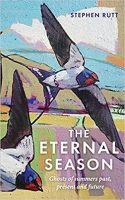 In The Eternal Season: Ghosts of summers past, present and future (Elliott & Thompson, £14.99), Stephen Rutt sets out to explore the natural world during its moment of fullest bloom. But he notices, too, the ways in which the season is being deranged by a changed and changing climate: the wrong birds singing at the wrong time; August days as cold as February. The book is both celebration and warning: “It sings,” his publisher says, “with love and careful observation, with an eye on all that we might lose but also save.”
In The Eternal Season: Ghosts of summers past, present and future (Elliott & Thompson, £14.99), Stephen Rutt sets out to explore the natural world during its moment of fullest bloom. But he notices, too, the ways in which the season is being deranged by a changed and changing climate: the wrong birds singing at the wrong time; August days as cold as February. The book is both celebration and warning: “It sings,” his publisher says, “with love and careful observation, with an eye on all that we might lose but also save.”
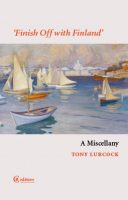 What do Britons make of Finland? Few are better placed to tell us than Tony Lurcock, a former lecturer in English at Finnish universities. Since 2010, he has been producing a series of compilations of accounts by travellers and writers, acclaimed in the TLS as “a fascinating prism through which to view modern Finland”. The fourth and final volume, Finish Off with Finland: A Miscellany, was published last week by that one-person publishing house Charles Boyle, otherwise known as CB editions (£12); you can download an extract from the publisher’s website.
What do Britons make of Finland? Few are better placed to tell us than Tony Lurcock, a former lecturer in English at Finnish universities. Since 2010, he has been producing a series of compilations of accounts by travellers and writers, acclaimed in the TLS as “a fascinating prism through which to view modern Finland”. The fourth and final volume, Finish Off with Finland: A Miscellany, was published last week by that one-person publishing house Charles Boyle, otherwise known as CB editions (£12); you can download an extract from the publisher’s website.
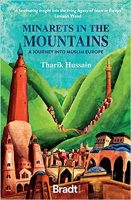 In Minarets in the Mountains (Bradt Guides, July 15, £9.99), Tharik Hussain, who was born in Bangladesh and grew up in the East End of London, travels with his family around the western Balkans. Following in the footsteps of the Ottoman explorer Evliya Çelebi, he takes them through Bosnia and Herzegovina, Serbia, Kosovo, North Macedonia, Albania and Montenegro, intent on exploring indigenous Muslim Europe in the 21st century. The book has won praise from writers including Tim Mackintosh-Smith (“A richly detailed travelogue by a humane and compassionate pilgrim”) and Ziauddin Sardar (“A scintillating voyage”).
In Minarets in the Mountains (Bradt Guides, July 15, £9.99), Tharik Hussain, who was born in Bangladesh and grew up in the East End of London, travels with his family around the western Balkans. Following in the footsteps of the Ottoman explorer Evliya Çelebi, he takes them through Bosnia and Herzegovina, Serbia, Kosovo, North Macedonia, Albania and Montenegro, intent on exploring indigenous Muslim Europe in the 21st century. The book has won praise from writers including Tim Mackintosh-Smith (“A richly detailed travelogue by a humane and compassionate pilgrim”) and Ziauddin Sardar (“A scintillating voyage”).

Leave a Reply